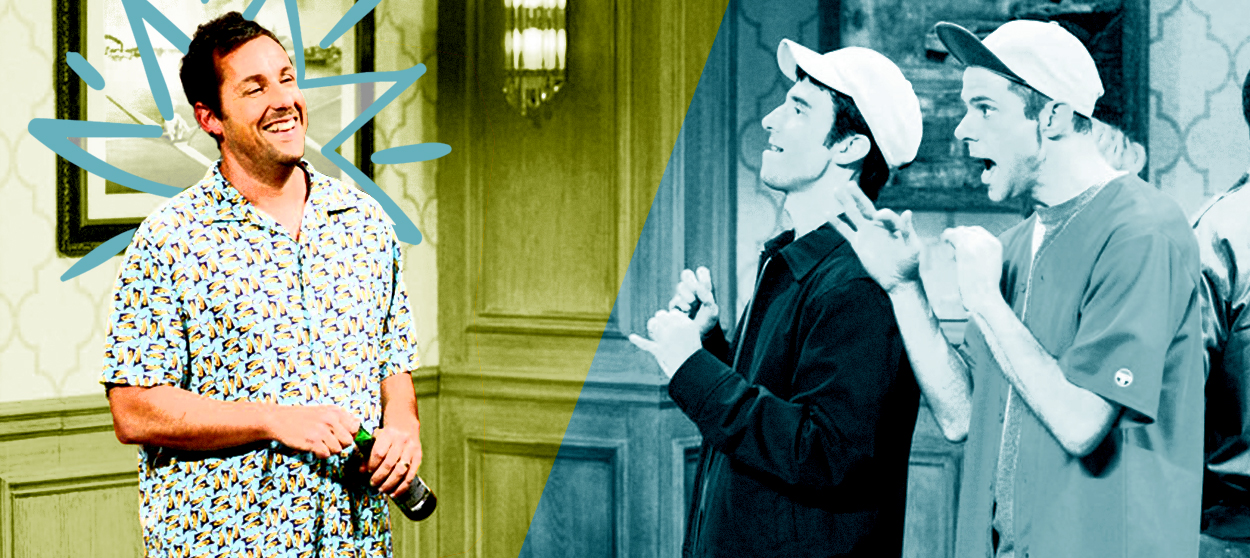Adam Sandler is good again
How the comedian rediscovered his magic


A free daily email with the biggest news stories of the day – and the best features from TheWeek.com
You are now subscribed
Your newsletter sign-up was successful
It's not unusual when a former Saturday Night Live staffer returns to the show to host. In the last few seasons alone, there have been episodes hosted by former cast cornerstones (Will Ferrell, Bill Hader), distinguished former "Weekend Update" anchors (Tina Fey, Seth Meyers), and even past writers (John Mulaney, Larry David). But when Adam Sandler hosted the show for the first time this past weekend, it felt like a genuine event.
Sandler, who was a writer and then cast member for the first half of the 1990s before going on to huge success in film comedies, was, before this weekend, arguably the highest-profile SNL guy who had never come back to host. Cast members as notoriously prickly as Chevy Chase and Bill Murray have done it multiple times, and even the famously ambivalent Eddie Murphy has technically hosted, albeit when he was still a cast member. Sandler has done a couple cameos, but even these are scarce; the last one was almost 17 years ago, to promote his long-forgotten animated movie Eight Crazy Nights.
When occasionally asked about returning to SNL, Sandler has shrugged it off, claiming that he did what he could on the show and doubting aloud whether he could keep up with newer, younger cast members. This self-analysis is compatible with the critical view of Sandler's later-period work: lazy comedies that don't require much of him beyond an approximation of his old rabble-rousing persona, updated in movies like Grown Ups or Jack and Jill to reflect his status as a slightly irascible suburban rich guy with cute kids and a lot of hangers-on.
The Week
Escape your echo chamber. Get the facts behind the news, plus analysis from multiple perspectives.

Sign up for The Week's Free Newsletters
From our morning news briefing to a weekly Good News Newsletter, get the best of The Week delivered directly to your inbox.
From our morning news briefing to a weekly Good News Newsletter, get the best of The Week delivered directly to your inbox.
Recently, though, Sandler has indicated a willingness to both make the most of his middle age and to circle back to earlier phases of his career. His heartfelt work in Noah Baumbach's The Meyerowitz Stories was his best serious-movie performance since Punch-Drunk Love and he embraced his transition from enfant terrible to dad. His deal with Netflix, which at first seemed to give him carte blanche to make his movies as indulgent and crony-employing as possible, recently yielded The Week Of, one of his best broad comedies and another dad role; he plays a doting Long Island father attempting to pay for his daughter's wedding (seriously, watch this movie; it's funny and sweet!). He also made a Netflix stand-up special (100% Fresh) — his first in decades.
100% Fresh revives a lot of familiar Sandler bits — goofy songs, silly voices — from a less youthful perspective, and his Saturday Night Live appearance continued in this vein. Rather than leaning on his old recurring characters, which tended to be intentionally simplistic goofballs (only Opera Man made a return appearance), Sandler was mostly integrated into the ensemble. He played the proprietor of an Italian tour group; an older father with erectile dysfunction in a fake commercial; and a terrorist issuing threats through a Snapchat filter. Even a self-referential sketch about a “Sandler Family Reunion” had him doing old shtick opposite most of the cast attempting their own imitations.
Sandler couldn't have pulled off most of these sketches during his actual tenure on the show, which was over before he turned 30. This was especially evident in the Italian tourism bit, one of the best sketches of the season. Spoofing a New York City-area local ad for guided tours of Italy (for anyone, but seemingly mostly for folks out of Long Island or New Jersey, as the sketch casually explains), Sandler's tour guide carefully and in great detail explains that while his vacations are wonderful, they can't work miracles: “If you're sad now, you might still feel sad there.” There's no anger or smirk in this explanation. Sandler's straight-faced sincerity in outlining all the ways that unhappy people can remain unhappy even while taking in the sights of Italy is a big part of why this sketch works so well. It's a frank acknowledgment of the unhappiness roiling beneath the more demonstrative characters of his youth.
In other sketches, Sandler was there more to pitch in. His willingness to cede laughs and screentime has been, at times, both a strength and a weakness. In his old SNL sketches, he often underplays next to Chris Farley, and his best movies give supporting players plenty of time to shine. He's never been one to suck up all the oxygen in the room in the style of a more manic comedian like Jim Carrey — which also means that in his worst movies, he stands back, and lets others do lazy guest routines. Sandler's most recent work has a sense of rediscovery, as if he's realized how to find both humor and pathos in his underplaying.
A free daily email with the biggest news stories of the day – and the best features from TheWeek.com
On the SNL gig, his most personal moments came at the top and bottom of the episode, first in a musical monologue where he sang a song about his unceremonious firing from the show back in the day (he and Chris Farley, among others, were part of a major housecleaning in 1995), and finally in a sincere tribute to his departed friend Farley, something he's been performing on tours and in his Netflix special. It's unabashedly sentimental, and has been publicly available for the better part of a year. But there's power in seeing Sandler perform it acoustically on the SNL stage, visibly emotional, concluding an episode that felt like a relieved exhale.
There will probably still be some disappointing Adam Sandler projects in the future. (His next Netflix feature, Murder Mystery, drops next month; the trailer isn't bad, but his last high-concept country-hopping comedy was the dire The Do-Over.) But for the moment, he's successfully revisiting his youth by admitting the ways it's passed by.
Jesse Hassenger's film and culture criticism has appeared in The Onion's A.V. Club, Brooklyn Magazine, and Men's Journal online, among others. He lives in Brooklyn, where he also writes fiction, edits textbooks, and helps run SportsAlcohol.com, a pop culture blog and podcast.
